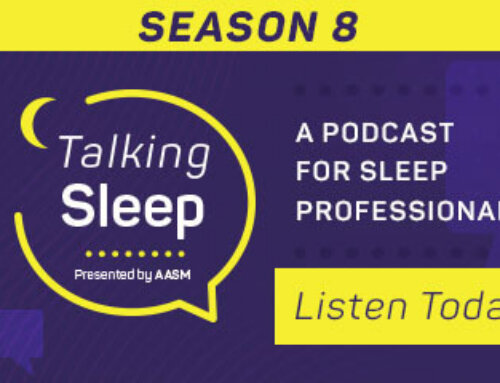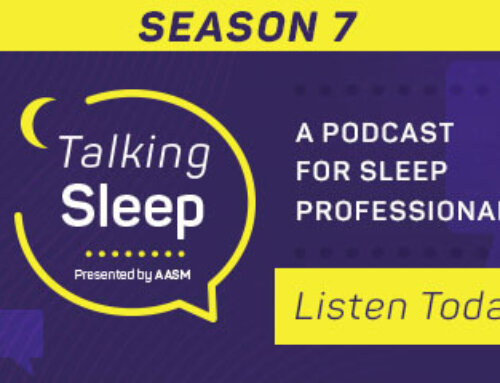Season 7 | Episode 20
In this episode of Talking Sleep, host Dr. Seema Khosla welcomes Dr. Doug Kirsch, Medical Director of Atrium Health Sleep Medicine and Clinical Professor in the Department of Neurology at Wake Forest School of Medicine, and Dr. Fariha Abbasi-Feinberg, president-elect of the AASM and private practice physician with Millennium Physician Group in Fort Myers, Florida, to introduce PLATO—a groundbreaking longitudinal assessment tool for obstructive sleep apnea.
The Epworth Sleepiness Scale has been a cornerstone of sleep medicine practice for decades, yet clinicians universally acknowledge its limitations in capturing the full patient experience. Similarly, PAP adherence—while important and part of Medicare’s MIPS program—tells only part of the story about treatment success. During his AASM presidency, Dr. Kirsch recognized the need for a more comprehensive metric and convened an expert advisory panel to develop a better solution.
The conversation traces PLATO’s development journey, which Dr. Rosen described as “Doug’s baby with a prolonged gestation.” Starting with 44 potential questions and utilizing the ICON methodology, the panel carefully refined the tool to capture domains beyond simple sleepiness—including quality of life, functional impairment, and symptom burden that the Epworth overlooks. Dr. Kirsch and Dr. Abbasi-Feinberg explain the validation process, how the tool discriminates between OSA severity levels, and why certain seemingly similar questions about sleepiness were all retained.
The episode addresses practical implementation questions: How is PLATO scored? Why do the first two sections use 5-point scales while the final section uses 10 points? Is it free to use, and how does one access it? Will it integrate into electronic health record systems like Epic? Most importantly, how should clinicians use this tool—will it replace the Epworth for Medicare requirements, or does it serve a different purpose?
The discussion also explores how PLATO relates to the recent AHRQ report on OSA treatment outcomes and why the tool focuses on patient-reported symptoms rather than solely cardiovascular endpoints. Dr. Kirsch shares his vision for PLATO’s future, including hopes for foundation grants to further study the tool and demonstrate that treating OSA and its associated sleepiness meaningfully improves patient outcomes.
Whether you’re frustrated with current assessment limitations, interested in value-based care metrics, or seeking better ways to document treatment efficacy beyond adherence data, this episode provides essential insights into a tool that may reshape how we measure success in sleep medicine.
Join us for this important discussion about moving beyond PAP adherence and Epworth scores to truly capture what matters to our patients.
Dr. Doug Kirsch
Dr. Doug Kirsch is the Medical Director of Atrium Health Sleep Medicine and Clinical Professor in the Department of Neurology at Wake Forest School of Medicine. As a former president of the American Academy of Sleep Medicine, Dr. Kirsch led the initiative to develop PLATO, a comprehensive longitudinal assessment tool for obstructive sleep apnea that moves beyond traditional metrics like the Epworth Sleepiness Scale and PAP adherence. His leadership in creating patient-centered outcome measures reflects his commitment to improving how sleep medicine practitioners document and demonstrate treatment efficacy in clinical practice.
Dr. Fariha Abbasi-Feinberg
Dr. Fariha Abbasi-Feinberg is the president-elect of the American Academy of Sleep Medicine and a sleep medicine physician in private practice with Millennium Physician Group in Fort Myers, Florida. As part of the expert advisory panel for PLATO development, Dr. Abbasi-Feinberg contributed to creating a validated tool that captures the full breadth of patient experience in obstructive sleep apnea treatment. Her involvement in AASM leadership and clinical practice provides valuable perspective on implementing practical assessment tools that improve patient care and outcome measurement in sleep medicine.


